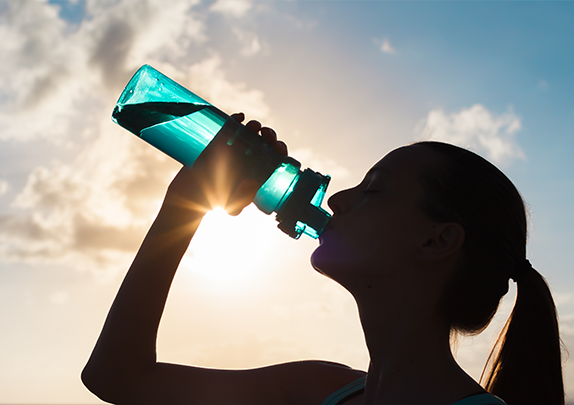Drinking water may be more important than you think. Your body doesn’t work well when it’s low on fluids. When it loses more water than it takes in, you may become dehydrated, which can lead to serious health problems.
You might not know when you’re dehydrated. It could be what’s behind your headache or why you feel tired and lack energy. It’s not something to ignore.
People of all ages may become dehydrated, but it’s especially dangerous for young children and older adults.

What Causes Dehydration?
The most common cause in young children is severe diarrhea and vomiting.
For adults, dehydration is common during heavy exercise or if you don't drink enough water during hot weather, but not drinking enough water over time can also lead to dehydration. You may not notice until it’s a problem. So, making sure you get enough every day is essential.
Older adults are at risk because they have less water in their bodies and often have health problems or take drugs that can cause dehydration.
Signs of Dehydration
Thirst is an obvious sign. Many people don't feel thirsty until they're already dehydrated. Dehydration can hit your body in many ways, including:
headache
lightheadedness
dizziness
tiredness
dry mouth
confusion
dark urine (anything darker than pale yellow)
muscle cramps
constipation
Children may have other warning signs, including fever, diarrhea or vomiting. They may sweat or seem tired when dehydrated. Babies may urinate less, have a dry mouth and make few tears. If you notice any of these signs in your baby, don’t wait to call their doctor. Dehydration in infants can quickly become a serious health issue.
What To Do if You’re Dehydrated
You can often turn around a mild case by drinking more fluids. Moderate and severe dehydration need urgent medical care, like IV hydration. Without medical care, it can lead to dangerous health issues like heatstroke and kidney failure.

Preventing Dehydration
You’ve probably heard that you should aim for eight glasses of water per day. That’s a great starting point, but how much water you need depends on your weight, age, level of activity, the climate where you are and other factors. Talk to your doctor about how much is right for you.
Here are a few hydration tips:
Drink water throughout the day, whether you feel thirsty or not. It may help to keep track of how much you’re drinking.
You may need more fluids in hot weather or with exercise.
Take small, frequent sips of water during workouts to keep your hydration level up.
Water is best, but sports drinks or fluids with added electrolytes can be helpful when you're exercising or sick.
Excessive caffeine and alcohol can dehydrate you. Up your water intake as needed.
Stay away from sugary sodas and sweetened fruit drinks that spike your blood sugar and don't offer any nutritional value.
Take it Seriously
Not drinking enough water may not seem like a big deal. While you may get over a mild case of dehydration quickly by upping your fluid intake, it can cause dangerous complications, like:
Heat-related injuries like cramps, exhaustion or heat stroke
urinary tract infections, kidney stones or kidney failure
seizures
low blood volume, shock, or a drop in blood pressure and oxygen in your body.
Moderate to severe cases may need hospital care with IV fluids to avoid organ failure and death.